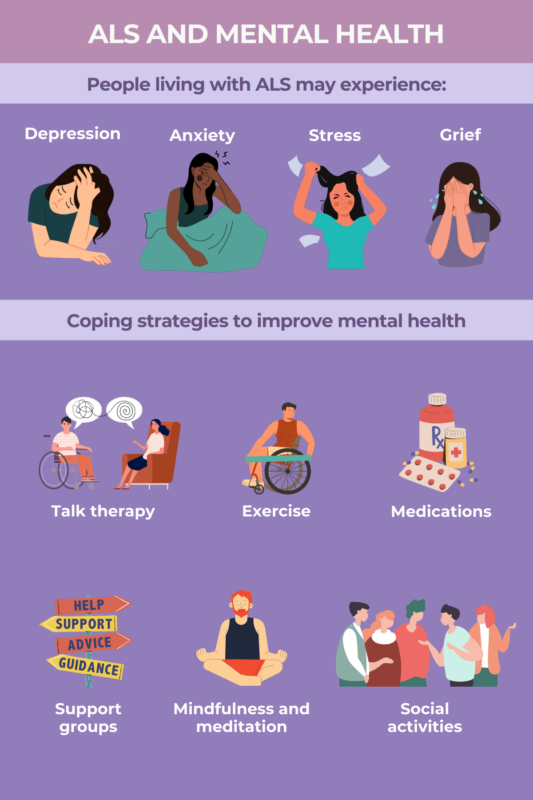ALS and mental health
Being diagnosed with amyotrophic lateral sclerosis (ALS) is life-changing. Navigating the impact it has on physical well-being can, not surprisingly, also affect mental health.
While some people may experience ALS-related neurological conditions that cause behavioral changes — such as the pseudobulbar affect (crying or laughing for no real reason), or memory loss and personality changes — mental health conditions like depression and anxiety are also prevalent among people with ALS.
But help is available for those living with ALS who are experiencing mental health issues. Therapy, medications, and emotional support groups and forums can ease the symptoms of depression or anxiety and help people cope.
Self-advocacy and asking others for help are also key.
After the diagnosis
The shock of an ALS diagnosis can spark a range of emotions, including anger, feelings of loss, and grief. These are normal feelings that many people experience as they come to terms with changes in their health.
The stress of a suddenly shortened lifespan and worries over the physical changes from the disease can understandably cause anxiety and depression, as well as worsen already existing mental health issues. These feelings may lead to a loss of focus and purpose in life. People facing an ALS diagnosis can also experience a sense of grief, which is often viewed as having five stages:
- denial, when it’s difficult to comprehend the diagnosis
- anger at yourself, someone else (the diagnosing doctor, for example), or the situation itself
- bargaining, or coming up with ways to undo the new reality
- depression, as a loss of hope about the future and difficulty coping with healthcare decisions, which can turn into clinical depression
- acceptance, or learning to live with ALS.
ALS News Today forum co-moderator Amanda Sifford, of Cape Coral, Florida, is a school psychologist who was diagnosed with the SOD1 mutation in 2010 while taking part in a presymptomatic familial ALS study. She had had sporadic symptoms for years before receiving her diagnosis in December 2022.
“On the forums, it seems that most pALS (people with ALS) feel the same way and have similar concerns. How will they change? How will their family survive financially, mentally and physically? Why isn’t there a cure? How do they plan for an unknown future? Who can help? Why don’t neurologists know more about ALS?” Sifford said.
She encourages people with ALS to reach out for help, take their prescribed medications, talk with a sympathetic person or a therapist, let go of unnecessary tasks and obligations, remain social, stay in touch or reconnect with friends and family, and face the diagnosis head-on.
“Most importantly, be able and willing to advocate for your medical, physical, and mental health needs. Be informed and make sure you are taking care of yourself to the best of your abilities. Let your loved ones know what you want now, and at the end. We all have an end; unfortunately, when you have an ALS diagnosis, it just feels like it’s hanging over your head — at least, until you adjust and accept the situation,” she said.
For herself, Sifford tries to keep a positive attitude, which she says is essential for making the most of each day.
Depression
Almost one-quarter of ALS patients experience depression. The risk of depression is often highest immediately before a person is diagnosed, and soon afterward.
Depression has been linked to cognitive impairment, such as a decline in verbal abilities and visual memory, as well as faster progression of ALS. Symptoms of depression can include:
- sadness and emptiness
- irritability
- lack of interest in activities
- lack of energy
- loss of appetite
- insomnia or oversleeping
- concentration problems
- feelings of worthlessness or guilt
- suicidal thoughts.
Clinical treatment for depression may include antidepressant medications, psychotherapy, and talking with others in a support group.
Commonly used medications for treating depression in people living with ALS are amitriptyline, mirtazapine, and selective serotonin reuptake inhibitors. Always speak with a doctor before starting any new medication.
Anxiety
It is common for a person with ALS to experience anxiety, due to worries over health symptoms and progression of the disease. Anxiety includes feelings of fear, dread, and uneasiness. It can lead to stress, panic attacks, and social isolation.
Difficulty breathing, or dyspnea, which is often described as “air hunger,” when a person is gasping for breath, can play a big role in ALS anxiety. Respiratory therapists can offer options to ease breathing, such as noninvasive ventilation, cough assist devices, or outline details of a tracheostomy and chronic ventilatory support.
Weight loss is also a common concern for people living with ALS, due to difficulty swallowing (dysphagia). Anxiety about this may cause a loss of appetite, leading to more weight loss.
Speaking with a nutritionist or dietitian can help reduce anxieties over choking on food and drink. They can also offer guidance about meal preparation. A speech therapist can help with swallowing techniques.
Other ALS symptoms, such as eye twitches, muscle twitches or shaking, throat tightness, numbness in the hands and feet, and fatigue, can contribute to feelings of anxiety.
Always consult a healthcare professional about medications and counseling for anxiety, and to discuss other coping methods for dealing with stress.
Medications that may be prescribed to treat anxiety in people with ALS include bupropion and benzodiazepines, which are available as diazepam suppositories and tablets, or lorazepam.
Daily coping strategies for easing anxiety and depression
A number of coping strategies may be helpful if you are struggling with mental health issues. These techniques can help you process your feelings and regain a sense of calm when things get difficult.
Talking to a friend or family member when dealing with difficult thoughts and emotions can help keep you from feeling withdrawn and isolated. This is especially important when ALS symptoms worsen. Connecting with a trusted friend or relative and talking, even about everyday happenings, can help you process their feelings.
Listening to music, or an audiobook, or watching a favorite movie or TV show can provide a welcome distraction and act as a mood booster. Music set at a frequency of 432 hertz, or an A tone, is thought to promote relaxation and reduce anxiety.
Outlining feelings in a journal allows time for reflection. These thoughts can be written by hand, typed, or dictated. Taking time to challenge negative emotions and finding something to feel grateful about can be beneficial, too.
Petting a companion animal, such as a dog or cat, can release oxytocin, or “feel-good” endorphins, and reduce cortisol, the stress hormone. Watching fish in an aquarium or birds through a window can also bring calmness of mind and lower stress.
Having an acupuncture session can affect the body’s nervous system in a positive way. This traditional Chinese medicine involves thin needles being inserted into the body, which can stimulate the emotional control area of the brain, helping to reduce anxiety.
Practicing yoga can lead to greater self-awareness, better happiness, and improved sleep. Yoga stretches incorporate breathing, meditation, and relaxation techniques, and adaptive yoga moves can be done solo or with assistance. Classes are available in-person or online, and there are also ALS-specific yoga videos.
Practicing deep breathing exercises can calm the mind and reduce physical symptoms of anxiety. Taking a slow, deep breath, while focusing the mind on the physical sensation of air flowing in the nose and out through the mouth, reduces heart rate and can provide a sense of calm. When trying deep breathing, find a comfortable position in a quiet room, allow the eyes to gently close, and breathe in slowly for a count of four, hold for a count of two, then out slowly for a count of six, for a duration of two minutes.
Practicing mindfulness and meditation can also relax the body and calm the mind. They both incorporate breathing exercises, guided imagery, and other techniques to help a person focus on the present moment. A number of meditation apps are available that contain guided meditation sessions, soothing music, and sleep stories that are good for both beginners and people with more experience.
Sifford said her work with students in a mental health field has shown her that coping with depression and anxiety can be a hard road.
“I knew having support would be essential and you can’t expect friends and family to be professional mental healthcare providers. Heck, they are going through it too just watching me. So, I made an appointment and talked to my doctor and I am on anti-anxiety medication at this time. That seemed like a smart thing to do, as well as I should practice what I preach!” she said.
Along with talking with her family and her doctor, Sifford does yoga, stretching, and meditation to ease her symptoms of mental fatigue.
People caring for someone with ALS may also experience depression and anxiety. As a person’s ALS symptoms worsen, they will need frequent physical and emotional support from their caregiver. The increased responsibility for care can be overwhelming for the caregiver. They may start to feel that their own quality of life has decreased, which can lead to feelings of hopelessness and depression.
It is critical that caregivers find time to take care of themselves and their own mental health as much as possible. Taking regular breaks to recharge can help caregivers feel their best and better cope with the situation at hand, which, in turn, will lead to them delivering better care.

Counseling and therapy
Speaking with a counselor or therapist can help anyone who is struggling with their mental health. Psychotherapy can ease symptoms of depression and anxiety. Types of psychotherapy include:
- cognitive behavioral therapy, in which a person learns skills to identify and change their behavior and thought patterns
- acceptance and commitment therapy, in which a person learns to accept their circumstances, and see them in a different context
- dialectical behavioral therapy, in which a person learns techniques for meditation and mindfulness.
Therapy is a safe space for people to communicate how they are feeling. While opening up to a therapist for the first time can feel scary, you shouldn’t let it stop you from getting the help you need. A healthcare professional can help find the right approach based on the symptoms and situation.
Support groups
People living with ALS need to feel supported emotionally, as well as physically. This can start with their own healthcare team, and include online and in-person support groups for them and their caregivers.
Support groups can also provide both professional and peer-to-peer methods for coping with ALS. They offer a sense of community and can help people access education, events, and other awareness activities that may be beneficial.
Local support groups can be found in most major cities in the U.S., as well as in Canada, the U.K., and Europe. The International Alliance of ALS/MND Associations maintains a list of associations around the globe, many of which offer support groups.
ALS News Today hosts online forums, as well as a Facebook page where people with ALS can connect with one another.
Sifford’s advice is to research the disease and connect with an ALS healthcare team.
“Being informed helps me. Just knowing what is happening in the areas of research and advocacy helps me adjust, plan, and hope,” she said.
Other online and in-person support groups are offered by the following organizations:
- ALS Association
- ALS Hope Foundation
- ALS Ride for Life
- Les Turner ALS Foundation
- Muscular Dystrophy Association
- ALS Canada
- Motor Neurone Disease Association (UK)
- Motor Neuron Disease Scotland.
Lifestyle changes
Lifestyle changes can also help support good mental health. Eating well, exercising, getting enough sleep, and social activities can make a real difference.
An ALS diet should focus on nutrient-rich foods and proteins to prevent malnutrition, whether eaten by mouth or fed through a gastrostomy tube. A healthy diet includes plenty of fruits, vegetables, and whole grain foods, and limits processed foods and those high in salt and sugar.
Exercise can help build muscle strength, aerobic capacity, and stamina. Gentle, repetitive exercise, such as walking or swimming, can help calm the mind, and promote better sleep. Consult a physical therapist before starting any exercise, as overexertion can damage muscles in a person with ALS.
Sleep helps the mind and body rest and regenerate, and a lack of sleep can lead to fatigue, irritability, and discomfort. There are many ways to increase the likelihood of getting a good night’s sleep:
- keeping a regular schedule, going to bed and getting up at the same time each day
- sleeping in a quiet, dark room, with no distractions
- turning off electronic devices an hour or more before bedtime
- playing gentle, repetitive music that is on a frequency of 432 hertz
- listening to a guided meditation about deep sleep
- checking with a doctor about medications that can aid sleep.
As symptoms may cause someone with ALS to become self-isolating and slide deeper into a mental funk, making the effort to engage in social activities can be a mood booster. Connecting with family and friends, in person or via video calls, and if possible, at social events, can trigger the release of neurotransmitters that lower responses to stress and anxiety.
Sharing how you are feeling with family and friends or asking for help when a problem or question arises can help you come to terms with changes related to ALS.
What to do in a mental health emergency
A mental health emergency (or crisis) is when someone’s behaviors and thoughts prevent them from functioning or indicate they might harm themselves or others. Feelings of distress can be overwhelming and previous coping methods don’t work.
According to the American Psychological Association, the most common sign of mental health crisis is “a clear and abrupt change in behavior.”
Warning signs of a mental health crisis include:
- intense changes in mood
- inability to function in daily tasks or take care of hygiene
- feeling increasingly agitated, angry, or violent
- self-medication or self-harm
- withdrawal from others
- hallucinations or delusions
- paranoia
- suicidal thoughts.
There are many crisis intervention services, including walk-in psychiatric urgent care, a hospital emergency department, or by calling 911.
If you are in immediate need of medical help or if someone else is in danger, call 911. When calling 911, it is helpful to state that a mental health crisis is unfolding, so the appropriate service is connected, such as a crisis intervention team.
Suicide ideation is thinking about or making plans to end life and can include thoughts and behaviors such as:
- actively seeking for ways to end life
- self-destructive behavior
- talking about suicide
- having no reason to live
- feelings of guilt, shame and failure
- withdrawal from family and friends
- excessive anger
- writing a will
- giving away possessions.
These are signs of an acute mental health emergency and should be taken seriously.
If you are having suicidal thoughts, reach out for help. Speak or text with a counselor at a crisis line:
- In the U.S., call the 988 Suicide and Crisis Lifeline at 800-273-8255 or dialing 988
- Military veterans can reach out to the Veterans Crisis Line by dialing 988 and pressing 1.
- Send a text to the Crisis Text Line at 741741 in the U.S. and Canada.
- Internationally, find country-specific crisis text lines here.
- Internationally, find country-specific crisis hotlines at Suicide Stop or Befrienders Worldwide.
Neurological conditions with similar symptoms
Certain neurological conditions associated with ALS can cause symptoms that can mimic mental health conditions, such as depression or anxiety.
The pseudobulbar affect occurs when a person experiences uncontrollable strong emotion, causing them to cry or laugh for no apparent reason. Research has connected this to changes in the brain, including alterations of the fronto-tempo-parietal-cerebellar circuits, but sometimes these symptoms can be mistaken for depression.
Pseudobulbar affect symptoms include:
- frequent bouts of uncontrollable crying or laughing
- strong emotion not tied to the way a person feels
- anger and frustration
- embarrassment, often leading to social isolation.
Frontotemporal spectrum disorder — including deficits in social cognition and language — is also common in people living with ALS. The condition is caused by nerve cell degeneration in the brain’s frontal and temporal regions, leading to memory loss, and personality and behavioral changes. It can also cause people to behave inappropriately in social situations.
Both of these conditions are due to neurological changes and require their own course of treatment. A person with ALS who is experiencing any of these symptoms should speak with a doctor about these changes.
ALS News Today is strictly a news and information website about the disease. It does not provide medical advice, diagnosis, or treatment. This content is not intended to be a substitute for professional medical advice, diagnosis, or treatment. Always seek the advice of your physician or other qualified health provider with any questions you may have regarding a medical condition. Never disregard professional medical advice or delay in seeking it because of something you have read on this website.
Recent Posts
- Longitude Prize on ALS encourages use of AI to find new treatments
- Living near toxic algal blooms tied to shorter survival in ALS patients
- How ALS taught me to feel emotions more deeply
- Thousands in US use ALS treatment Radicava ORS, company says
- A well-oiled machine with training and checklists for ALS caregivers
FAQs about ALS and mental health
Receiving a life-changing diagnosis of ALS can cause depression, with one-quarter of people living with ALS experiencing depression. If a person is feeling some of the symptoms of depression for two or more weeks — apathy, lack of appetite, tiredness, or feeling worthless or suicidal — it’s important to seek professional mental healthcare.
Anxiety cannot cause ALS. Although the exact causes of ALS are not known, increased risks for developing the disease can be linked to genetics, environmental exposures, and lifestyle habits. However, living with ALS can definitely cause anxiety.
There are certain symptoms of anxiety that can mimic some of the symptoms of ALS, including fatigue, irritability, and difficulty concentrating. However, the main sign of ALS is muscular weakness, followed by breathing difficulties, and speech problems. Anxiety about ALS after diagnosis can make some symptoms worse, especially as the disease progresses, so it’s important to seek professional mental healthcare.
In the U.S., Medicare Part B covers outpatient healthcare services and doctor’s appointments, including mental health counseling for people living with a disability such as ALS.
ALS mental health conditions include anxiety, which includes feelings of fear, dread, and uneasiness, and depression, which can cause symptoms such as irritability, lack of interest in activities, lack of energy, loss of appetite, and insomnia or oversleeping, among others. Neurodegeneration due to the disease itself may also affect the ability to control strong emotions, leading to behavioral changes.
Related Articles

 Fact-checked by
Fact-checked by 







